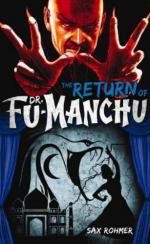“Yes,” I replied shortly; “but we could find no trace—no trace.”
“You—er—were interested?”
“More than I knew,” I replied, “until I realized that I had—lost her.”
“I never met Karamaneh, but from your account, and from others, she was quite unusually—”
“She was very beautiful,” I said, and stood up, for I was anxious to terminate that phase of the conversation.
Eltham regarded me sympathetically; he knew something of my search with Nayland Smith for the dark-eyed, Eastern girl who had brought romance into my drab life; he knew that I treasured my memories of her as I loathed and abhorred those of the fiendish, brilliant Chinese doctor who had been her master.
Eltham began to pace up and down the rug, his pipe bubbling furiously; and something in the way he carried his head reminded me momentarily of Nayland Smith. Certainly, between this pink-faced clergyman, with his deceptively mild appearance, and the gaunt, bronzed, and steely-eyed Burmese commissioner, there was externally little in common; but it was some little nervous trick in his carriage that conjured up through the smoky haze one distant summer evening when Smith had paced that very room as Eltham paced it now, when before my startled eyes he had rung up the curtain upon the savage drama in which, though I little suspected it then, Fate had cast me for a leading role.
I wondered if Eltham’s thoughts ran parallel with mine. My own were centered upon the unforgettable figure of the murderous Chinaman. These words, exactly as Smith had used them, seemed once again to sound in my ears: “Imagine a person tall, lean, and feline, high shouldered, with a brow like Shakespeare and a face like Satan, a close-shaven skull, and long magnetic eyes of the true cat green. Invest him with all the cruel cunning of an entire Eastern race accumulated in one giant intellect, with all the resources of science, past and present, and you have a mental picture of Dr. Fu-Manchu, the ‘Yellow Peril’ incarnate in one man.”
This visit of Eltham’s no doubt was responsible for my mood; for this singular clergyman had played his part in the drama of two years ago.
“I should like to see Smith again,” he said suddenly; “it seems a pity that a man like that should be buried in Burma. Burma makes a mess of the best of men, Doctor. You said he was not married?”
“No,” I replied shortly, “and is never likely to be, now.”
“Ah, you hinted at something of the kind.”
“I know very little of it. Nayland Smith is not the kind of man to talk much.”
“Quite so—quite so! And, you know, Doctor, neither am I; but”—he was growing painfully embarrassed—“it may be your due—I—er—I have a correspondent, in the interior of China—”
“Well?” I said, watching him in sudden eagerness.
“Well, I would not desire to raise—vain hopes—nor to occasion, shall I say, empty fears; but—er . . . no, Doctor!” He flushed like a girl—“It was wrong of me to open this conversation. Perhaps, when I know more—will you forget my words, for the time?”




